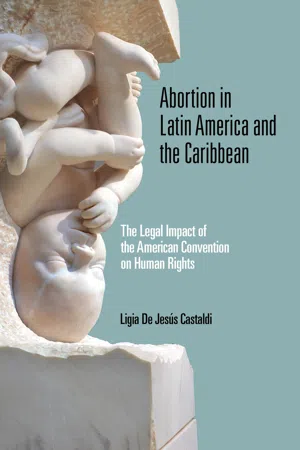
Abortion in Latin America and the Caribbean
The Legal Impact of the American Convention on Human Rights
- 520 pages
- English
- ePUB (mobile friendly)
- Available on iOS & Android
Abortion in Latin America and the Caribbean
The Legal Impact of the American Convention on Human Rights
About this book
Abortion in Latin America and the Caribbean is the first major book to analyze the abortion laws of the Latin American and Caribbean nations that are parties to the American Convention on Human Rights. Making use of a broad range of materials relating to human rights and abortion law not yet available in English, the first part of this book analyzes how Inter-American human rights bodies have interpreted the American Convention's prenatal right to life. The second part examines Article 4(1) of the American Convention, comparing and analyzing the laws regarding prenatal rights and abortion in all twenty-three nations that are parties to this treaty. Castaldi questions how Inter-American human rights bodies currently interpret Article 4(1). Against the predominant view, she argues that the purpose of this treaty is to grant legal protection of the unborn child from elective abortion that is broad and general, not merely exceptional.
Abortion in Latin America and the Caribbean offers an objective analysis of national and international laws on abortion, proposing a new interpretation of the American Convention's right-to-life provision that is nonrestrictive and provides general protection for the unborn. The book will appeal not only to students and scholars in the field of international human rights but also to human rights advocates more generally.
Frequently asked questions
- Essential is ideal for learners and professionals who enjoy exploring a wide range of subjects. Access the Essential Library with 800,000+ trusted titles and best-sellers across business, personal growth, and the humanities. Includes unlimited reading time and Standard Read Aloud voice.
- Complete: Perfect for advanced learners and researchers needing full, unrestricted access. Unlock 1.4M+ books across hundreds of subjects, including academic and specialized titles. The Complete Plan also includes advanced features like Premium Read Aloud and Research Assistant.
Please note we cannot support devices running on iOS 13 and Android 7 or earlier. Learn more about using the app.
Information
Table of contents
- Halftitle
- Title
- Copyright
- Dedication
- Contents
- Acknowledgments
- Abbreviations
- Introduction
- One The Inter-American Commission on Human Rights’ Inconsistent Treatment of the Prenatal Right to Life
- Two The Inter-American Court of Human Rights’ Restrictive Approach to the Prenatal Right to Life
- Three Toward a Nonrestrictive Interpretation of the American Convention’s Prenatal Right to Life from Conception
- Four Evolutive Interpretation: State Practice on Prenatal Personhood and Human Rights Entitlement
- Five Evolutive Interpretation: State Practice on the Treaty Obligation to Legally Protect Prenatal Life from Abortion
- Six Systemic and Historic Interpretation: Relevant Rules of International Law and the Convention’s Preparatory Work
- Conclusion
- Notes
- Bibliography
- Index